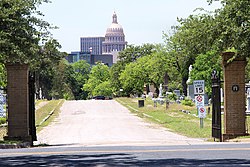Oakwood Cemetery, originally called City Cemetery, is the oldest city-owned cemetery in Austin, Texas. Situated on a hill just east of I-35 that overlooks downtown Austin, just north of the Swedish Hill Historic District and south of Disch-Falk Field, the once-isolated site is now in the center of the city.
City Cemetery | |
 The entrance to the cemetery off Comal Street | |
| Location | 16th & Navasota Austin, Texas, US |
|---|---|
| Coordinates | 30°16′36″N 97°43′35″W / 30.27667°N 97.72639°W |
| MPS | East Austin MRA |
| NRHP reference No. | 85002297[1] |
| Added to NRHP | September 17, 1985 |
History
editThe cemetery dates from the mid-1850s. It may have begun even earlier, as legend states that its first tenants were victims of a Comanche attack whose bodies were laid to rest on the same hill.
The cemetery was renamed Oakwood in 1907 per city ordinance. It spreads over 40 acres (160,000 m2), including an annex across Comal Street to the east, and includes sections historically dedicated to the city's black, Latino, and Jewish populations. Paupers were historically buried in unmarked graves on the cemetery's south side. Graves without permanent markers were subject to reburial after a given period.
In 1914, the Oakwood Cemetery Mortuary Chapel was built on a design by Texas architect Charles Henry Page as a site for memorial services. The chapel was later renovated and remodeled in 1944 under the direction of local architect J. Roy White.[2]
The cemetery became a Recorded Texas Historic Landmark in 1972 and was added to the National Register of Historic Places in 1985; its annex was added on October 30, 2003. The view of the Texas State Capitol from Comal Street in the center of the cemetery became one of the Capitol View Corridors protected under state and local law from obstruction by tall buildings in 1983.[3] Despite its protected status, the cemetery has been subject to crime, vandalism, and decay for decades.
Notable burials
edit- Wilmer Allison (1904–1977) – Tennis player
- John Barclay Armstrong (1850–1913) – Texas Ranger (Hall of Fame), U.S. Marshall, and rancher. Captured the notorious killer John Wesley Hardin.
- Richard Bache Jr. who represented Galveston in the Senate of the Second Texas Legislature in 1847 and assisted in drawing up the Texas Constitution of 1845
- Thomas N. Barnes (1930–2003) Fourth Chief Master Sergeant of the Air Force
- Annie Webb Blanton (1870–1945) – First woman elected to statewide office in Texas. Served as State Superintendent for Public Instruction (1919–22)
- Albert S. Burleson (1863–1937) – United States Postmaster General (1913–21)
- Florence Anderson Clark (1835–1918) – author, newspaper editor, librarian, university dean
- Dabney Coleman (1932-2024) - Actor
- Oscar Branch Colquitt (1861–1940) – Governor of Texas (1911–15)
- Susanna Dickinson (1814–1883) – Alamo survivor
- John Crittenden Duval (1816–1897) – "Father of Texas Literature"
- John Henry Faulk (1913–1990) – Radio personality
- Rebecca Jane G. Fisher (1831–1926), the only woman elected to the Texas Veterans Association and its last surviving member, the first woman to have her portrait hung in the Senate Chamber at the Texas Capitol.
- James M. Goggin (1820–1899) – CSA army officer
- Thomas Green (1814–1864) – American Civil War general
- Thomas Watt Gregory (1861–1933) – US Attorney General (1914–19)
- Andrew J. Hamilton (1815–1875) – Governor of Texas (1865–66)
- Morgan C. Hamilton (1809–1893) – U.S. Senator (1870–77)
- John Hancock (1824–1893) – Member of the United States House of Representatives (1871–85)
- Hardaway Hunt Dinwiddie (1844-1887) - 4th President of Texas A&M, founding member of Alpha Tau Omega fraternity
- Ima Hogg (1882–1975) – Philanthropist
- James S. Hogg (1851–1906) – Governor of Texas (1891–95)
- John Garland James (1844-1930) - 2nd President of Texas A&M, founding member of Alpha Tau Omega fraternity
- Jacob Kuechler (1823–1893) — German immigrant, surveyor, conscientious objector during the Civil War
- George W. Littlefield (1842–1920) – Cattleman, banker, University of Texas Regent
- John Lomax (1867–1948) – Author and musicologist
- Hermann Lungkwitz (1813–1891) — Painter and photographer
- Henry Green Madison (1843–1912) – First African-American City Councilman of Austin
- John Marks Moore (1853–1902) — Secretary of State of Texas (1887–91)
- Nimrod Lindsay Norton (1830–1903) – Confederate officer and politician, later prominent businessman
- Elisha M. Pease (1812–1883) – Governor of Texas (1853—57, 1867–69)
- Oran M. Roberts (1815–1898) – Governor of Texas (1879–83)
- James T. Robison (1861–1929) – Texas Land Commissioner (1909-1929)
- John J. Terrell (1857–1920) – Texas Land Commissioner (1903–1909)
- Ben Thompson (1842–1884) – City Marshal of Austin
- William M. Walton (1832–1915) – Attorney General of Texas (1866–67)
- Charles S. West (1829–1885) – Texas Supreme Court justice and Secretary of State of Texas
References
edit- ^ "NRHP nomination form" (PDF). Texas Historical Commission.
- ^ "City of Austin Cemeteries – Introducing the Master Plan Process" (PPT). City of Austin. Retrieved July 19, 2017.
- ^ "Downtown Development and Capitol View Corridors" (PDF). Downtown Austin Commission. June 27, 2007. Retrieved November 10, 2017.
External links
edit- Austin Chronicle – "City of the Dead"
- U.S. Geological Survey Geographic Names Information System: Oakwood Cemetery
- U.S. Geological Survey Geographic Names Information System: Oakwood Cemetery Annex
- Oakwood Cemetery at Find a Grave
- Austin History Center, Oakwood Cemetery Database
- Plat of Old Section of City Cemetery (1911)